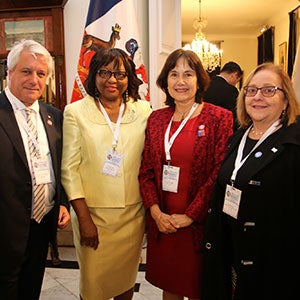
Santiago, Chile, July 3, 2017 (PAHO / WHO) - Health inequities are "not only unjust, they also threaten the advances we have made in the last decades and endanger economic growth and social development" in Latin America and the Caribbean, said PAHO Director Carissa F. Etienne during the High Level Meeting for Every Woman, Every Child, Every Adolescent, which concluded in Santiago on 4 July.
Over the past 10 to 15 years, countries in the Americas have made significant progress in reducing poverty and promoting prosperity, Etienne said. However, "variations in access and coverage of women's, children's and adolescents' health services between and within countries persist, and sometimes are expanding."
The meeting was opened by President Michelle Bachelet of Chile, as co-chair of the High-level Steering Group for Every Woman Every Child. The movement puts in action the Global Strategy for Women's, Children's and Adolescents' Health, launched in 2010 by former United Nations Secretary-General Ban Ki-moon as a roadmap to improve health and well-being for all women, children and adolescents, leaving no one behind.
The meeting in Chile marks the Latin American and Caribbean launch of the Global Strategy for Women, Children and Adolescents, which provides a road map for ending preventable deaths among women, children and adolescents, and for ensuring their well-being. Representatives from nine countries in the region and regional directors of UN agencies and international cooperation were among the participants.
In her remarks, PAHO Director Etienne noted that in some Latin American countries, the percentage of births attended by qualified personnel is nine times higher for mothers with secondary schooling than for mothers with no education; and mothers and children living in rural communities may be twice as likely to receive no post-natal care as those living in urban communities. She also pointed out that girls in the poorest quintiles show an unmet need for family planning about four times greater than those in the richest quintiles; and adolescent pregnancy in some countries is 40% higher among Afro-descendant women.
The director of PAHO, which serves as Regional Office for the Americas of the World Health Organization (WHO), said that these inequalities jeopardize progress that has been made towards universal health coverage in the region. Despite these challenges, "it is our obligation to ensure that political actions reach the most disadvantaged people first."
Etienne said that addressing inequities and improving people's health requires "addressing health from a broader context - involving all stakeholders," as health is influenced by a complex combination of physical, social, economic, cultural and environmental factors.
"The post-2015 development agenda can only be achieved if we start working in a more collaborative and cross-sectoral way," she said. "Now more than ever, multidisciplinary and multisectoral partnerships are needed so that people can achieve an optimal level health and well-being."
Members of the Every Women, Every Child: Latin America and the Caribbean (EWEC - LAC) movement include the Inter-American Development Bank (IDB), PAHO/WHO, UNAIDS, the United Nations Population Fund (UNFPA), UNICEF, the United States Agency for International Development (USAID) and the World Bank. The movement is a continuation of the "A Renewed Promise for the Americas" movement and supports the countries of the Region in interpreting and implementing the Global Strategy for Women, Children and Adolescents within their specific context, which also contributes to achieving the targets of the Sustainable Development Goals (SDGs).
Links:
- Global Strategy for Women's, Children's and Adolescents' Health, 2016-2030
- Every Woman, Every child



